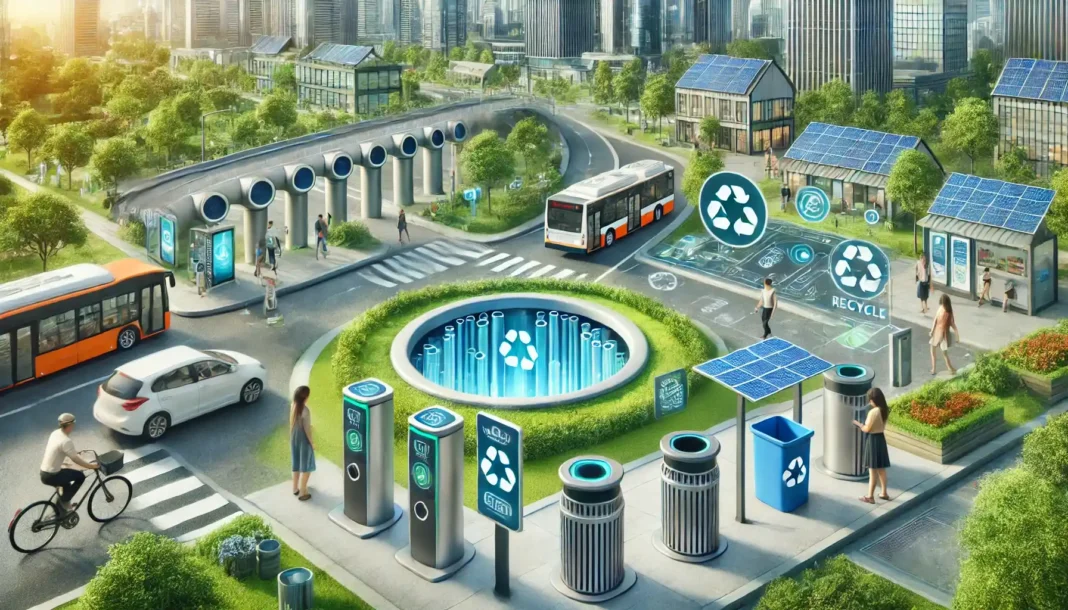In the current era recognized by rapid change and heightened environmental awareness, Waste Management Operations are advancing at an unprecedented pace.
The pressing challenges of climate change and urban expansion necessitate sustainable approaches, making innovation in waste management crucial.
Acknowledging this critical need, the National Solid Waste Management Authority (NSWMA) has made significant strides forward.
Through its initiative titled “Revolutionizing Waste Management: Harnessing Technology and Public Education,” the agency is utilizing technology to improve efficiency, sustainability, and community involvement in Jamaica.
Let us examine how these initiatives are reshaping not only garbage collection but also the broader framework of Waste Management Operations in the region.
A New Era of Waste Management: Embracing Intelligent Technology
The NSWMA has swiftly recognized that conventional methods are insufficient to address the current demands of waste management.
In a recent press conference held at the Authority’s headquarters in Kingston, Executive Director Audley Gordon and Director of Operations Aretha McFarlane introduced a technology-driven approach aimed at optimizing services and minimizing environmental impact.
Smart Tracking Systems: Enhancing Real-Time Efficiency
A significant advancement has been the incorporation of vehicle-tracking systems within the NSWMA’s fleet.
These systems facilitate real-time monitoring of garbage collection trucks, enabling supervisors to oversee each vehicle’s route, fuel consumption, and the duration of garbage collection across different communities.
This innovation not only contributes to reducing fuel waste but also allows for the immediate identification of inefficiencies.
If a truck deviates from its designated route, automatic alerts are triggered, thereby curbing unauthorized detours and promoting optimal fuel usage.
Additionally, this technology aids in accurately calculating operational costs, which is beneficial for budgeting and strategic planning.
Time-Stamped Photographs: A Model of Accountability
In addition to GPS tracking, trucks are fitted with cameras that take time-stamped photographs. These images serve as visual confirmation of service completion, greatly improving transparency and accountability.
As a matter of fact, both residents and administrators can confirm the timing of garbage collection. This method minimizes complaints and fosters greater trust in the system.
Furthermore, these photographs aid in assessing crew performance and refining collection routes. By examining this visual data, the NSWMA can identify areas that need more frequent pickups or locations where illegal dumping is occurring.
Enhancing Fleet Health through Preventative Maintenance
Efficiency extends beyond route optimization. The new technology is also crucial for vehicle maintenance. Utilizing the gathered data, the NSWMA has established an automated schedule that alerts staff when trucks require servicing.
This proactive strategy ensures that vehicles remain in optimal condition, thereby reducing breakdowns and extending the lifespan of the fleet.
Previously, trucks were often taken out of service unexpectedly, resulting in delayed pickups and a backlog in waste collection.
Now, with timely notifications, maintenance becomes predictable and manageable, ensuring a greater number of trucks are available for daily operations. This directly contributes to lowering customer dissatisfaction and upholding a clean environment.
Rotational Readiness: Reducing Downtime
Another benefit of this system is the improved rotation of trucks across various routes. With each unit under constant monitoring, planners can allocate resources effectively, preventing service gaps. This readiness enables the NSWMA to respond promptly to emergency requests or special events without disrupting regular collection schedules.
Public Empowerment via a Mobile Application
In alignment with contemporary convenience, the NSWMA is enhancing its digital footprint. A revamped mobile application is currently under development, aimed at fostering greater public engagement and tailoring services to individual needs. Upon its release, residents will have the capability to:
– Report missed waste collections
– Notify authorities about illegal dumping activities
– Request special pickups for oversized items
This interactive communication represents a significant advancement. Previously, the public had limited avenues to voice their concerns.
Now, with just a few taps, they can receive prompt responses and real-time updates. This level of responsiveness not only bolsters public trust but also cultivates a culture of environmental stewardship.
Immediate Feedback for Swift Solutions
The app will enable the NSWMA to gather essential feedback from the community. Residents can report issues as they arise, facilitating a quicker resolution process.
The information collected will also aid in optimizing the system, enhancing the efficiency of future responses. In essence, the public is not merely receiving services they are actively involved in shaping their waste management practices.
How Technology is Redefining Waste Management Operations
The approach taken by the NSWMA transcends mere tools and technology; it represents a fundamental transformation in the conceptualization and execution of Waste Management Operations.

By integrating technology throughout its workflow, the agency has shifted from a reactive service model to a proactive operational ecosystem.
With the implementation of real-time data collection, managers now possess a holistic understanding of their operations. This enhanced visibility facilitates more effective resource allocation, expedited decision-making, and informed long-term strategic planning.
Every aspect, including routes, fuel costs, service interruptions, and maintenance requirements, is now traceable and subject to analysis.
This data-driven strategy allows the NSWMA to respond swiftly to changing conditions. For example, during periods of increased waste production, such as holidays or natural disasters, the agency can promptly adjust schedules and fleet assignments.
This adaptability helps mitigate overflow problems and maintains cleaner communities.
Furthermore, technology has transformed customer service beyond traditional call centers. Automated responses, push notifications, and app-based service updates keep residents informed at all times.
This level of transparency fosters stronger community connections and encourages individuals to take greater responsibility for their waste management practices.
Expert Editorial Comment
Jamaica’s NSWMA is establishing a benchmark for waste management authorities throughout the Caribbean and beyond.
By embracing innovation and prioritizing both people and the environment, the agency is redefining the possibilities within Waste Management Operations.
In essence, the NSWMA’s efforts extend beyond the mere introduction of technology; they have initiated a cultural and operational transformation that emphasizes efficiency, accountability, and environmental responsibility.
As the global community seeks more effective waste management solutions, this initiative stands out as a symbol of advancement.

